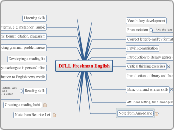по Karen Chung 16 лет назад
312
DFLL Freshman English
In a discussion about the DFLL Freshman English program, the complexity of dealing with various forms of English, such as British, American, Canadian, and Australian, was highlighted.

по Karen Chung 16 лет назад
312

Больше похоже на это
From Ann-Marie:
In reading: in addition to vocabulary and comprehension, noticing how the article was
constructed (transitions, cohesion/coherence devices). Outlining how the article was
organized. This would only take a few minutes to do, but it would have enormous value
in composition and presentations!
how to evaluate resources
how to use reference books (like dictionaries, thesaurus, Language Activator)
hyphenation
the basic fact that there are different Englishes (British vs American vs Canadian vs Australian), so they need to be careful when picking up new vocabulary, new pronunciations. (ie, don't mix and match)
how to answer short and long essay exam questions
study skills for literature
study skills for independent language learning
how to use email while working on long term group projects
for grammar: somehow students never learn the sequence of adjectives (two brown wooden boxes not wooden two brown boxes)
I know I'm reaching for the sky here, but it would be great if some of the readings in FE would be about challenges faced by students and the skills they could use in meeting the challenges. E.g. goal setting, time management, bicycle maintenance. I know that these aren't in textbooks, but it would be so helpful if we could use these
types of really useful content in the readings....
Dear Colleagues,
I apologize for not having made myself clear at the meeting yesterday and thus would presume to take some more of your time.
In my humble opinion, every required course needs to be well defined. That is partly why, instead of “English Literature 1” and “English Literature 2,” we set exact period boundaries among the required literature courses. Instructors can map their territories, and students will better know what to expect. Along these lines, we may even consider renaming “OT 1” and “OT 2” as “English Conversation” and “Public Speaking” respectively.
The sheer size of the department and, accordingly, the huge number of required courses/sessions offered, demands clear-cut boundaries among them. Most required courses have more than one session, and instructors don’t always meet before they compile their syllabi. Also people take turns to teach various titles. Only by setting clear boundaries, preferably with a brief guideline for each required course, different and new instructors know what to do.
For the same reason, I’d think an all-inclusive “Freshman English” presents technical challenges. Even though the course for the next academic year has already been carefully planned, thanks to Karen, the continuation of this scheme cannot be guaranteed. Would the course always require three teachers from different fields (EFL and Literature) to co-teach? This seems to complicate scheduling and to restrict the use of manpower. If co-teaching is not the rule, then would an EFL or Literature instructor be forced to teach unfamiliar areas, using assigned materials? Do students really benefit from such teaching?
I totally agree with Karen that students need all the skills she lists. Yet, many of those are already covered by other courses: “OA 1” (listening, pronunciation), “Introduction to Literature” (literary terms and genres), “Composition” (plagiarism, grammar, practical writing), and “Introduction to Linguistics” (phonetics, pin-yin). Perhaps practical writing (resume, email, etc.) is not currently taught in all Composition courses, but it can be easily incorporated into them in the future, as long as all instructors are informed. May I also suggested that a guided tour to the library be included as well?
What remains uncovered, I think, is mainly reading and critical thinking. If we decide to keep “Freshman English” which, in my humble opinion, we can do without, it can focus on these areas. Based on their specialty and interests, instructors are free to choose the reading materials, literature or non-literature. It can be 2 hours a week, not 4. Although reading and thinking are the focus, students will nonetheless get to develop/employ their other skills—listening and speaking, if not writing.
I am not against the idea of offering oral training in the junior year, but I wonder if it should be required. Not all students aim at becoming rhetoricians—some never acquire the skills of public speaking in their native tongue. I think we should provide the fundamental language training in the first 2 years, and leave students enough room to develop their own paths in the next 2 years by reducing required courses for juniors and seniors. We can offer an elective “OT 3” (entitled “Argumentation and Debate,” “Professional Presentation,” etc.) and an elective “Composition 3” (entitled “Creative Writing,” “Academic Writing,” etc.)
Thank you for your patience in reading this long email.
All the best,
Beatrice
Bi-qi Beatrice Lei
Assistant Professor, Dept of Foreign Languages and Literatures
Giles: One of the best ways for students to improve their English grammar and vocabulary (and of course their reading skills) is by reading for pleasure. This involves self-selected reading at a level where each student can read comfortably (i.e. it should not be too difficult). This will help them cope with more difficult reading in later years, but is also an end in itself: if students have a reading habit, they will continue to improve their English independently of classes and teaching. Few students actually do this without encouragement, and many have commented that their first experience of reading non-required books, and actually enjoying reading in English, was the freshman English class.